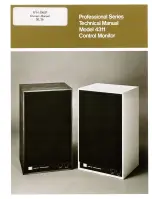
ARTEX PRODUCTS / ACR ELECTRONICS, INC.
DESCRIPTION, OPERATION, INSTALLATION AND MAINTENANCE MANUAL
ELT 1000 (P/N: A3-06-2749-1)
Y1-03-0259 Rev. U
Company Confidential
Page 37 of 62
INSTALLATION
1.
Regulatory Requirements and Guidelines
A.
For US Registered aircraft:
WARNING:
FAILURE TO REGISTER THIS ELT WITH NOAA BEFORE INSTALLATION COULD
RESULT IN A MONETARY FORFEITURE BEING ISSUED TO THE OWNER.
1)
To enhance protection of life and property, it is mandatory that each 406.0-406.1 MHz ELT be registered with
NOAA before installation and that information be kept up-to-date. In addition to the identification plate or label
requirements, each 406.0-406.1 MHz ELT is provided on the outside with a clearly discernible permanent plate
or label containing the following statement: “The owner of this 406.0-406.1 MHz ELT must register the NOAA
identification code contained on this label with the National Oceanic and Atmospheric Administration (NOAA),
whose address is:
NOAA/SARSAT Beacon Registration
NSOF E/SPO53
1315 East West Hwy
Silver Spring, MD 20910-3282
2)
Aircraft owners must advise NOAA in writing upon change of aircraft or ELT ownership, or any other change
in registration information. Fleet operators must notify NOAA upon transfer of ELT to another aircraft outside
of the owner's control, or another change in registration information. NOAA will provide registrants with proof
of registration and change of registration postcards.
B.
TSO C126a, Paragraph D
1)
TSO approval of the ELT does not constitute installation approval. All ELT installations are subject to field
approval for a given airframe by either an approved FAA DER or FAA FSDO. For installations outside the US,
contact your local civil aviation regulatory agency for details.
2)
The remote switch is a requirement of TSO C126a and installation is mandatory.
3)
The buzzer is a requirement of TSO C126a and installation is mandatory.
C.
FAA
1)
This manual constitutes supporting data, as described in AC43.9-1, Paragraph 6.h.(2) and AC 43-210, Chapter
2, Paragraph 201(a)(6), and as such may be used as support for FAA field approval of the ELT installation.
2)
In addition to the procedures outlined herein and in accordance with FAR Part 43, the installer must adhere to
the aircraft manufacturer’s instructions and recommendations and the guidelines provided by FAA Advisory
Circular AC 43.13-2 “Acceptable Methods, Techniques, and Practices - Aircraft Alterations,” specifically
Chapters 1 through 3, 11, and 13.
3)
By signing the aircraft logbook, and FAA Form 337, the installer is stating the installation has been performed
in accordance with current FAR requirements and the procedures outlined therein. The completed Form 337
is provided to the FAA and also becomes a permanent part of the aircraft maintenance records in accordance
with AC43-9, Paragraph 17.
D.
Canada
1)
All installations must be performed in accordance with Canadian Aviation Regulations (CAR) Part V, Chapter
551, § 551.104.
E.
Other Countries
1)
Installations in aircraft outside of the United States and Canada, must be performed in accordance with
applicable regulatory authority rules and regulations.
















































